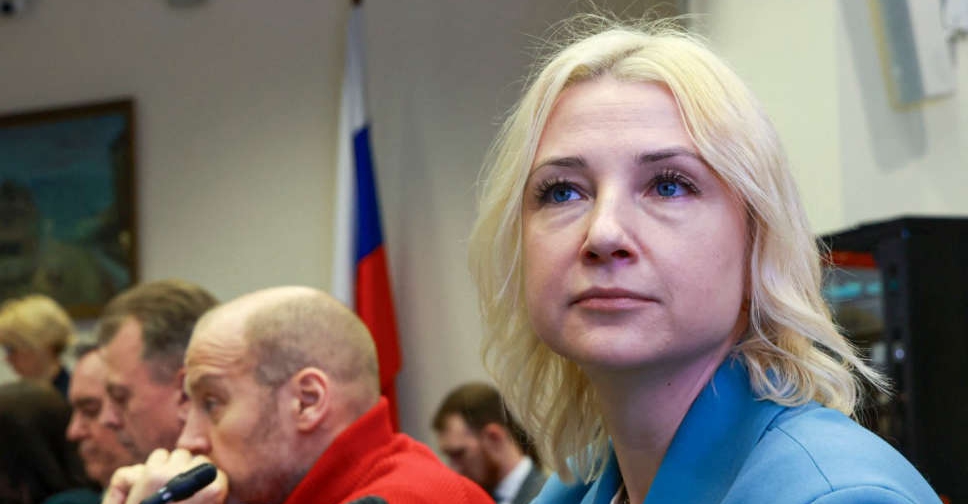
Former TV journalist Yekaterina Duntsova was disqualified on Saturday from running against President Vladimir Putin in an election next March because of alleged flaws in her application to register as a candidate.
Video from a meeting of the central electoral commission showed members voting unanimously to reject the candidacy of Duntsova, who had wanted to run on a platform to end the war in Ukraine and release political prisoners.
Putin's critics seized on her disqualification as proof that no one with genuine opposition views would be allowed to stand against him in the first presidential election since the start of the 22-month war. They see it as a fake process with only one possible outcome.
The Kremlin says Putin will win because he enjoys genuine support across society, with opinion poll ratings of around 80 per cent.
The head of the electoral commission, Ella Pamfilova, offered words of consolation to Duntsova after her rejection.
"You are a young woman; you have everything ahead of you. Any minus can always be turned into a plus. Any experience is still an experience," Pamfilova said.
Screenshots posted by a telegram channel representing Duntsova showed documents that it said the commission had highlighted as lacking proper signatures.
Duntsova, 40, told reporters her team had assembled the application in a hurry and had trouble finding a lawyer to certify the bid after dozens of others declined.
She said she had approached veteran liberal politician Grigory Yavlinsky about the possibility of submitting a new application to represent his Yabloko party.
"I hope there will be some kind of reaction... We have similar values in principle," Duntsova said.
But Yavlinsky said in an interview on a YouTube channel that Yabloko would not back her "because we don't know her".
Duntsova had presented papers to the electoral commission less than 72 hours earlier to support her bid. It was largely ignored by pro-Kremlin state media, which also failed to report on her disqualification.
BELARUS SCENARIO
When Duntsova said last month that she wanted to stand, commentators had variously described her as brave or part of a Kremlin-scripted plan to create the appearance of competition.
"Any sane person taking this step would be afraid - but fear must not win," she told Reuters in an interview in November.
Abbas Gallyamov, a former Kremlin speechwriter now labelled by the authorities as a "foreign agent", said Putin had not wanted to risk the same scenario as Alexander Lukashenko.
The Belarussian leader clung to power in 2020 only with the help of what the opposition and Western governments said was large-scale ballot rigging to enable him to claim victory over opposition candidate Sviatlana Tsikhanouskaya.
"The Tsikhanouskaya effect is absolutely possible, and in the Kremlin, they understand that," Gallyamov wrote on Telegram.
With Putin in full control of the levers of power, supporters and opponents alike say he will cruise to a new six-year term, which, if he completes it, would make him Russia's longest-serving ruler since the 18th century - outlasting all Soviet rulers, including Josef Stalin.
His best-known opponent, Alexei Navalny, is serving prison sentences totalling more than 30 years, and his supporters say they do not even know where he is after they were told he had been moved from his previous penal colony earlier this month. Lawyers last had access to him on December 6.
Russia's Communist Party, whose candidates have finished a distant second to Putin at every election since 2000, was meeting on Saturday to nominate Nikolai Kharitonov, a 75-year-old who stood previously in 2004 and won 14 per cent of the vote to Putin's 71 per cent.

 UK inquiry finds 'chilling' cover-up of infected blood scandal
UK inquiry finds 'chilling' cover-up of infected blood scandal
 Iranian President Raisi killed in helicopter accident, state media says
Iranian President Raisi killed in helicopter accident, state media says
 ICC prosecutor seeks arrest warrants for Israeli, Hamas leaders
ICC prosecutor seeks arrest warrants for Israeli, Hamas leaders
 Assange given permission to appeal against US extradition
Assange given permission to appeal against US extradition
 Israel intends to broaden Rafah sweep, Defence Minister tells US
Israel intends to broaden Rafah sweep, Defence Minister tells US




